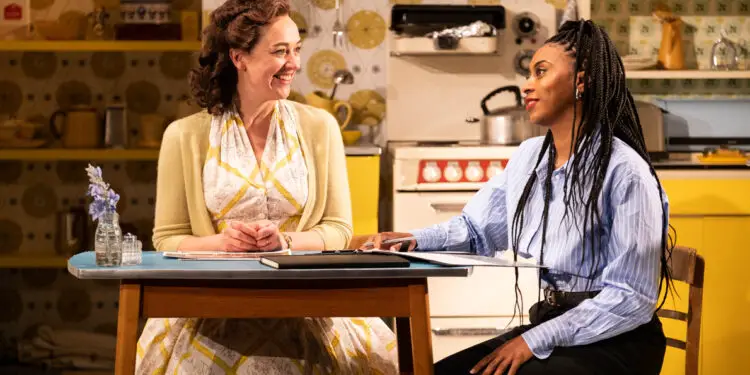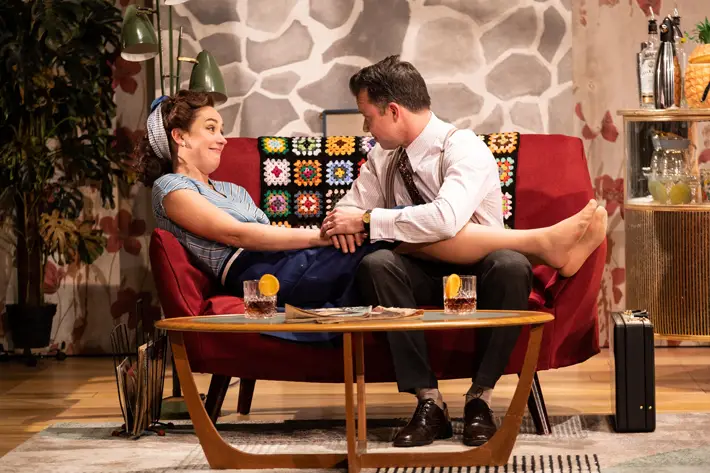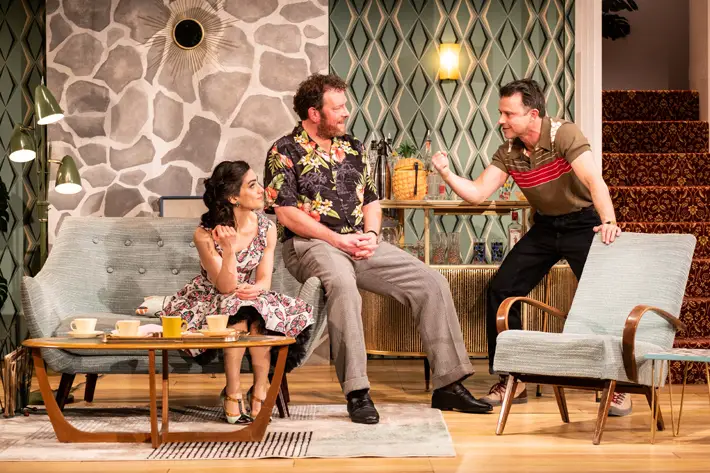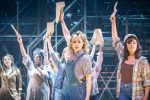Home, I’m Darling – Review – Sheffield Lyceum Theatre

By Clare Jenkins, April 2023
Back in 1951, a decade before Betty Friedan’s ground-breaking feminist tract The Feminine Mystique, the novelist and broadcaster Annabel Williams-Ellis wrote a book called The Art of Being a Woman. Far from being a Barbara Cartland-type admonition to women to be the perfect ‘wee wifie’ and domestic goddess, it explored women’s complicated role in society. As the blurb put it: “Home is, of course, deeply important, but will a home in which the wife and mother is a ‘Human Sacrifice’ really be a happy one?”
The answer came in the book’s final line: “The art of being a woman is to remember that, in order to give life, we must take care to be alive ourselves.”
Laura Wade’s Olivier Award-winning play, written nearly 70 years later (it was first performed at Theatr Clwyd in Mold in 2018), shows that such issues are still being debated (sometimes hotly) today.
It opens with a cartoonish image of 1950s suburban ‘bliss’. Judy (Jessica Ransom) is twirling round her lemon-yellow Formica kitchen, every inch the pin-up girl, delighted to have boiled an egg to perfection for estate agent husband Johnny (Neil McDermott, veering between wet and wolfish). Shouting their marital delight at each other (it takes a while for the general over-projection to subside, sometimes into inaudibility), they revel in their Doris Day/Rock Hudson lifestyle.
“Are you happy, darling?”
“Sickeningly happy!”
“Subtle and subversive”
With the wave of a feather duster, Wade – together with director Tamara Harvey and set designer Anna Fleischle – conjures up the world of the 1950s in glorious technicolour. Candy-striped, full-petticoated dresses, orange frou-frou night-robes, pineapple-shaped ice buckets, cheese straws and devilled eggs… But, as the opening song, ‘Mr Sandman’, indicates, the magic beam of fantasy has blinded Judy to reality.
In exasperation, her ex-hippy commune mother Sylvia (Diane Keen, whose more low-key, naturalistic acting style seems to belong to a different production) cries, “The 50s didn’t even look like this in the 50s!” She goes on to list some of the stark realities of the decade: no central heating, bomb craters, the tail-end of rationing, no birth control or abortion rights, racism, homophobia and a gender power imbalance. “You’re being nostalgic,” she concludes, “when you weren’t even there.”
As the play’s (rather silly) title might seem to suggest, this is seeing the world backwards. It’s also an increasingly subtle and subversive study of the neurosis of nostalgia. Judy, now 38, had a good job in finance and a devoted husband who shares her love of the 50s. One day, with voluntary redundancy on offer, she decided to turn their hobby into a lifestyle choice, and spend her life as the perfect housewife – cleaning behind cupboards, preparing delicious meals, greeting hubby on the doorstep with her lippy on, his slippers and cocktail at the ready.
But the façade is a charade as brittle as Judy’s surface bubbliness and cracks eventually appear. Johnny, a beta male uneasily cast in an alpha role, develops a crush on his boss Alex (Shanez Pattni, all swinging braids and tip-tappety stilettoes). Judy, increasingly anxious and trapped in a prison of her own making, hides their faltering finances from him (Ransom does sparky-eyed desperation extremely well).
“Dark undercurrents”
Best friend and fellow rockabilly Fran (a sparklingly gabby Cassie Bradley) discovers that her husband Marcus (Matthew Douglas) is a sweaty-palmed sexist and groper of other women. A round of applause here for the actors’ nifty, cleverly choreographed scene changes on the beguilingly retro set, often including a bit of jiving or jitterbugging.
By the end of the play, Judy’s horizons have started to widen again as she moves forwards. Not as far as the 21st century, but it’s a start.
The script, though at times over-reliant on cheap swearword laughs, starts as light and frothy as Anna Fleischle’s dazzling dresses, if over-slickly delivered. But dark, ever-topical undercurrents gradually emerge about the tensions between femininity and feminism (Sylvia’s dungaree-clad activism vs her daughter’s Angel in the House act). What does it mean to be a woman – and a man, for that matter? What do women really want? What, ultimately, makes a woman, and a happy marriage?
Well, not a Be-Ro cookbook, a cheese straw or a perfect chocolate chiffon cake, that’s for sure.
‘Home, I’m Darling’ is at the Lyceum until Saturday
images: Jack Merriman











